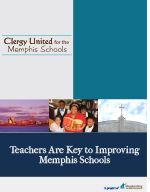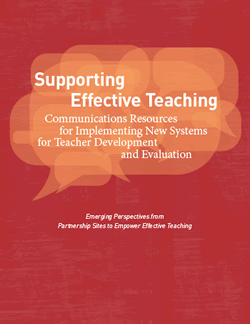-
Lesson 11: Work with External Champions
Third-party partners such as businesses, community-based organizations, and local foundations provide important early and sustained support for the work. They offer external validation that the effort is worth doing — and doable. They, too, have an important stake in the work. They provide the additional credibility needed to build the broad-based community understanding and support required to implement and sustain the reforms. And in many cases, they provide much-needed additional resources — from funding to people — to help spread the word.
Leaders from Memphis, Pittsburgh, Hillsborough County (FL), and elsewhere offer some practical advice.
Make sure everyone is on the same page about the goals and timeline. When multiple stakeholders are involved, there is always the challenge of bringing everyone up to speed — and keeping them there. And there is always a risk of “lone rangers” going their own way.
"By design, the I Teach, I Am campaign created a lot of energy, which brought in many partners. They wanted to be part of the work, which was very positive. But it was hard to corral, collaborate, and cooperate. It was hard to keep people on message."— Diane Terrell (Memphis City Schools)Make sure they understand how this work fits into the big picture of reform. Clear messages that help “connect the dots” are critical. External audiences will not be as invested as school staff in the details of professional development and teacher evaluation. But they definitely want to know and should be able to communicate how this work will help students and, more generally, how better schools will help the community. (More on messaging in Lesson 5.)
Ensure that partners have very specific things to do. As part of its effort to build support for layoffs based on effectiveness in Pittsburgh, for example, A+ Schools mounted a public campaign that featured about a dozen very specific actions, from sending postcards to writing letters to the editor to using social media to share information.
Take advantage of “odd bedfellows.” In Hillsborough County, for example, teachers especially valued hearing from parents because they were valued as a “neutral party,” said former PTA President Melissa Erickson. She also said that having three-way community forums with the superintendent, union leaders, and teacher leaders reinforced that all were engaged and united. In Memphis, the Council for a Strong America helped organize the clergy, the business community, and retired military leaders in support of the reforms. According to Council for a Strong America’s Jeff Kirsch: “Our efforts generally are bipartisan, focused on the middle, designed to win moderates.”
Examples from the Field:
A+ Schools (Pittsburgh)
The nonprofit organization has several main priorities, including making school information more accessible and understandable, improving student outcomes and equity, strengthening school board governance, and ensuring teaching quality in every classroom. General initiatives include a detailed annual report on school performance, regular monitoring of school board meetings, voter education, and School Works action research projects through which community members conduct in-depth interviews with school staff about school practices.
To build support for teaching effectiveness, its I Heart Great Teaching campaign has played a crucial role in promoting the teacher effectiveness work. An early step was mobilizing support that helped earn Gates Foundation funding in 2009; T-shirts, postcards, signs, and the like helped generate 1,800 signatures. Its detailed Tools, Rules, and Schools report examined professional development, staffing patterns, and working conditions — making a research-based case for change. Its three organizers helped inform and involve parents. Its one-pager documented progress in key areas. And most recently, its Make Great Teaching Count campaign mobilized community pressure to end seniority-based layoffs. The campaign offered detailed background on the issues and gave community members multiple opportunities to weigh in.
"We've seen movement on some issues: Hiring is more timely, fewer principals report hiring challenges, more teachers have demonstrated passion for the kids at their school, and all schools are implementing the new RISE evaluation system and teachers are reporting that it's fair."— Carey Harris (A+ Schools)Council for a Strong America (Memphis)
The nonprofit works nationally and locally to bring different voices into the school reform debate: 5,000 police chiefs and law enforcement officers, 600 business leaders, 300 retired generals and admirals, and 300 pastors. In Memphis, it focused on organizing the clergy through a new group, Clergy United for the Memphis Schools, which now has about 60 pastors and ministry leaders. Its report on the importance of effective teaching drew strong media attention, while its follow-up Sunday Celebration of Teachers gave the community a focused opportunity to thank the city’s teachers.
One key piece of advice from Council for a Strong America’s Jeff Kirsch: Local chapters need to be staffed with organizers.



